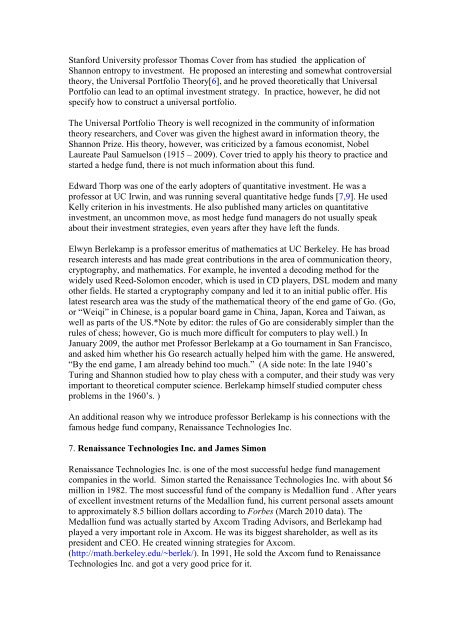Financial Signal Processing, Bubble Detection, Reflection Detection
Financial Signal Processing, Bubble Detection, Reflection Detection
Financial Signal Processing, Bubble Detection, Reflection Detection
Create successful ePaper yourself
Turn your PDF publications into a flip-book with our unique Google optimized e-Paper software.
Stanford University professor Thomas Cover from has studied the application of<br />
Shannon entropy to investment. He proposed an interesting and somewhat controversial<br />
theory, the Universal Portfolio Theory[6], and he proved theoretically that Universal<br />
Portfolio can lead to an optimal investment strategy. In practice, however, he did not<br />
specify how to construct a universal portfolio.<br />
The Universal Portfolio Theory is well recognized in the community of information<br />
theory researchers, and Cover was given the highest award in information theory, the<br />
Shannon Prize. His theory, however, was criticized by a famous economist, Nobel<br />
Laureate Paul Samuelson (1915 – 2009). Cover tried to apply his theory to practice and<br />
started a hedge fund, there is not much information about this fund.<br />
Edward Thorp was one of the early adopters of quantitative investment. He was a<br />
professor at UC Irwin, and was running several quantitative hedge funds [7,9]. He used<br />
Kelly criterion in his investments. He also published many articles on quantitative<br />
investment, an uncommon move, as most hedge fund managers do not usually speak<br />
about their investment strategies, even years after they have left the funds.<br />
Elwyn Berlekamp is a professor emeritus of mathematics at UC Berkeley. He has broad<br />
research interests and has made great contributions in the area of communication theory,<br />
cryptography, and mathematics. For example, he invented a decoding method for the<br />
widely used Reed-Solomon encoder, which is used in CD players, DSL modem and many<br />
other fields. He started a cryptography company and led it to an initial public offer. His<br />
latest research area was the study of the mathematical theory of the end game of Go. (Go,<br />
or “Weiqi” in Chinese, is a popular board game in China, Japan, Korea and Taiwan, as<br />
well as parts of the US.*Note by editor: the rules of Go are considerably simpler than the<br />
rules of chess; however, Go is much more difficult for computers to play well.) In<br />
January 2009, the author met Professor Berlekamp at a Go tournament in San Francisco,<br />
and asked him whether his Go research actually helped him with the game. He answered,<br />
“By the end game, I am already behind too much.” (A side note: In the late 1940’s<br />
Turing and Shannon studied how to play chess with a computer, and their study was very<br />
important to theoretical computer science. Berlekamp himself studied computer chess<br />
problems in the 1960’s. )<br />
An additional reason why we introduce professor Berlekamp is his connections with the<br />
famous hedge fund company, Renaissance Technologies Inc.<br />
7. Renaissance Technologies Inc. and James Simon<br />
Renaissance Technologies Inc. is one of the most successful hedge fund management<br />
companies in the world. Simon started the Renaissance Technologies Inc. with about $6<br />
million in 1982. The most successful fund of the company is Medallion fund . After years<br />
of excellent investment returns of the Medallion fund, his current personal assets amount<br />
to approximately 8.5 billion dollars according to Forbes (March 2010 data). The<br />
Medallion fund was actually started by Axcom Trading Advisors, and Berlekamp had<br />
played a very important role in Axcom. He was its biggest shareholder, as well as its<br />
president and CEO. He created winning strategies for Axcom.<br />
(http://math.berkeley.edu/~berlek/). In 1991, He sold the Axcom fund to Renaissance<br />
Technologies Inc. and got a very good price for it.



